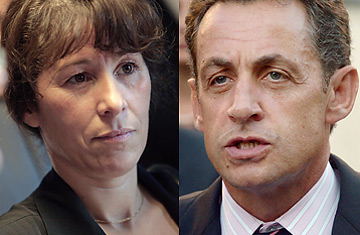
Fadela Amara and Nicolas Sarkozy
Since his election to the Elysée on a platform of deep and sweeping reform, French President Nicolas Sarkozy has repeatedly pledged a "rupture" with the past habits, attitudes and endless calculating that have frozen so many of his country's previous governments into virtual immobility. One area he's done just that is in assembling his government under the ideologically blind policy of "ouverture" — the "opening" of cabinet posts to erstwhile leftists opponents whose talents Sarkozy believes will serve the nation well. But while initially applauded by many pundits for ignoring traditional hostilities that have previously made bipartisan governments impossible in France, there are now signs that Sarkozy's political pragmatism is being undermined by the all too common right-left splits within his cabinet.
The loudest cracks yet to ring out from Sarkozy's bipartisan plank of "ouverture" came Tuesday morning, when Secretary of State for Urban Affairs Fadela Amara lashed out at controversial immigration legislation awaiting final passage in parliament. If everything goes exactly to schedule, the law is expected to be passed on October 23. Amara used the undiplomatic term "degueulasse" — combining elements of "sickening" and "disgusting" — to describe an article of the law introducing DNA testing of certain new foreign residents to France and the storage of that data. Amara similarly denounced the law for allowing race to be noted in census taking — a dramatic break with France's traditional "republican value" of ignoring race, religion and gender among nominally equal citizens. Leftist parliamentarians have also denounced the measures as dangerous posturing by ruling conservatives seeking to placate public concerns on topics like immigration, national identity and crime.
"As the daughter of immigrants myself, I'm saying people are fed up of seeing immigration exploited whenever a specific [political]objective arises," Amara told France Inter radio of the DNA testing.
"I don't want people to be defined by their origins or religion," noted Amara before explaining her hostility to race being noted in censuses. "Creating categories within the population is dangerous."
Within hours of those comments, Patrick Devedjian, general secretary of Sarkozy's ruling Union for a Popular Movement party called on Amara to cease "insulting majority legislators" — people, he noted with pointed contrast, who "are the ones who support the government."
And Amara wasn't the only leftist cabinet member to take a swipe at the controversial legislation. High Commissioner for Social Solidarity Martin Hirsch also decried an article in the law banning illegal aliens from emergency homeless shelters. In contrast to Amara's emotional denunciation of the law, Hirsch said he remained confident of convincing parliamentarians to amend the text during its final reading in parliament.
But the pair's chiming out has turned heads nevertheless. Amara was recruited for her widely applauded struggle to defend the rights of women, immigrants and residents of France's blighted housing projects as the head of the group "Ni Putes, Ni Soumises" (Neither Whores Nor Submissive). Hirsch, meanwhile, previously headed an organization caring for and defending the homeless founded by the Abbé Pierre. The recruitment of both well-known leftists was considered as big a coup for Sarkozy as the luring of a Socialist Party figure like Bernard Kouchner to his cabinet. Their declarations will embolden critics from within Sarkozy's own conservative ranks who have long opposed the very policy of "ouverture" — and who just last week were scolded by the President for upping the volume of their criticism.
Some conservatives have enviously groused about leftists occupying cabinet posts they had coveted for themselves. Most, however complain that blurring the ideological lines running through the government without erasing them has created a mix of contrasting policies and positions confusing voters on its real direction — or even coherency. Ironically, even many of those advocates of an exclusively conservative cabinet balked at approving the immigration law on principles of their own. Indeed, nearly two weeks before Amara opposed the legislation, the immigration bill nearly foundered before an upper house of parliament that felt elements of it might create a witch-hunt environment targeting legal and illegal immigrants alike. The legislation was finally passed after being considerably watered down, but it marked another significant case of the previously surging Sarkozy encountering resistance from within his own ranks and government.
"Sarkozy has to be very careful about creating these fronts of opposition where they wouldn't have existed otherwise, because the composite effects will really undermine his authority," says Dominique Reynié, an author and professor at Paris' Foundation of Political Sciences. Reynié notes that municipal elections set for next March will serve as a barometer of voter approval with government action under Sarkozy. Sufficient dissatisfaction, he says, could provoke a tide of Socialist victories capable of reinvigorating the left as an opposition force — and create pressure exacerbating divisions within conservative ranks. "Because of that Sarkozy doesn't want to create any more excuses for dissent and division within his own majority. And he certainly doesn't want to give leftist members of government the opportunity to attack his policies — and perhaps eventually quit their posts accusing Sarkozy of lack of good will."
